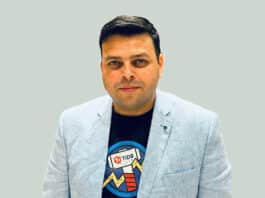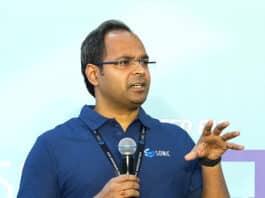GlobalLogic, a leader in software R&D services, has been able to offer its clients shorter product development cycles and ensure that the right features are implemented on time. Open source technology has been instrumental in extending such a helping hand. Deepak Gupta, associate vice president, technology, GlobalLogic, talks to Vanisha Joseph of LFY about the opportunities for FOSS and Linux experts in R&D services hubs like theirs.
Q: What promise does open source technology hold for FOSS and Linux experts in India?
A: Open source has become a leading trend across industries over the last 15 years. Be it media, scientific projects, telecom, IT, retail, banking etc, today open source is making its presence felt in almost every sector. From developing new products using FOSS to implementing enterprise solutions to integrating open source modules with existing commercial blocks – there are a whole gamut of opportunities for FOSS and Linux experts. In India, though we don’t have too many independent software vendors (ISVs), we see an escalating demand for open source and open source experts who are developing products/solutions or offering services for companies in the West across sectors.
Q: What value-add does FOSS provide in the process of project/product development?
A: The biggest advantage the use of FOSS provides to the process of project/product development is freedom from vendor lock-in. Between the date on which the product/project development starts and the date of go-to-market, business needs change very rapidly. The flexibility of not having a vendor lock-in provides numerous options to developers and product managers to adapt to the changing needs. This in turn reduces upfront costs in the beginning of the project.
Further, using open source the company is more responsive to the changing business needs resulting in faster time to market. Another advantage is the support of open standards, which makes integration and interoperability between the tools and technologies easy. One no longer has to be dependant on one commercial software vendor. The community support is long lasting and viable giving our developers more confidence.
Q: Is the cost advantage one gets by using open source technology for project/product development substantial?
A: The cost advantage involving no upfront cost is a huge driver for companies adopting open source tools for project development. However, the total cost of ownership of products/projects using open source is not free. There is the added cost of the entire open source ecosystem – including support, maintenance, customisation etc. Thus, although the cost advantage is present it is lower than the perception.
Q: You spoke about community support — cost advantage being a boon for companies using FOSS/Linux for product development. Does the boon become a bane if a company opts for an immature platform?
A: Yes, it is true that the advantage of community support resulting in cost savings and more flexibility applies mainly for mature open source platforms. The presence of open source technology gives one, multiple options to choose tools to meet project requirements but it comes with the challenge of selecting the right tool set. The cost advantage gets diluted for nascent open source platforms as one needs to work a lot on developing the platform and such development costs are high. Further, the continuous updates from the community (more seen in nascent platforms) can make the project development very complex and slow.
For instance, when I first started building Java Enterprise product based on J2EE stack around 1999, the technology then was emerging, which resulted in new specifications coming out every two months. This posed a huge challenge both to the developers and product managers. While developers faced day-to-day challenge upgrading their existing code to new specifications, product managers remained in dilemma whether they should release their product now or wait for something new coming in pipeline, thus affecting their go-to-market strategy. Because of the constant changes happening in the underlying platform, sometimes community support becomes questionable in these scenarios. However, today FOSS offers lot of mature platforms and tool stacks, and we work on many such mature technology stacks to avail the advantage of FOSS in product development.
Q: What are the key tools that your company is using for project development?
A: We use all stacks of open source tools. Talking about programming languages, JAVA is our forte but we also do a lot of development on Ruby, PHP, Perl, Python and Scala (modern multi-paradigm programming language). With respect to database, MySQL remains one of our favourites. We also use Postgres, Ingres, Apache Derby, etc for database management. On the server side of the operating system, we have adopted various flavours of Linux like RHEL, Fedora and Ubuntu. We also use lot of other open source offerings from the Apache family, application servers like JBoss, tools like OpenCMS, Spring etc..
Q: Elaborate briefly on your open source offerings.
A: GlobalLogic is in the business of software R&D Services. We have tools, processes and consulting experience to help companies develop products using the open source stack quickly and cost-effectively. Talking about tools and processes, we offer solutions like Velocity, which is a combination of process and platform, and also an integrated suite of open source and open source-derived tools for collaboration, requirement engineering, Agile project management and build management.
This platform is very useful for teams spread across geographies as it provides end-to-end traceability between work items, starting from business requirements and extending all the way to final test execution results and release decision support. This visibility helps distributed teams identify bottlenecks early and accelerate product development. Apart from that, we offer Velocity Objects which are reusable software product frameworks that can be used with standardised architecture and technology stacks for distributed software development. Using these frameworks help reducing the time to market by great extent.
In consulting, we help early stage ISVs, who have pressure to bring out the product faster to market, identify the right open source stack for their functional and non-functional needs. Also companies using commercial licence components and already running live, face the problem of recurring cost of commercial licenced tools eating into their profit margins. We help them identify similar offerings in open source domain and demystifying the legal impact of using open source in their products. We also help commercial software companies using open source tool stack, making them understand the legal jargons around open source.
Q: What has been the contribution so far by developers at GlobalLogic towards open source?
A: This is an area that GlobalLogic is looking to make more progress over the next fiscal. Our developers have developed Chrysalis framework, which is a Java-based J2EE framework for enterprise-ready Java platforms. This is as of now available off-the-shelf to our partners but we hope to contribute it to the community soon. We also have developed EntlibAOP framework built on .Net technology that we have donated to Codeplex community. It is still in beta shape and we plan to do more work in the area. We also encourage our developers to write code for various open source projects but don’t have exact data on the contributions made so far.
Q: The community is known to be very giving in nature. At what levels has the community helped you during project development?
A: Yes, the community has been a crucial nerve for GlobalLogic. With developments happening on various open source technology stacks, our engineers sometimes find it difficult to be aware of each new development happening around. We have got stuck in the past during implementations of open source in products and have posted queries to the community. The quick response has not only helped our developers resolve troubleshoots but also boosted their confidence to work on open source.
Q: Adopting open source for project development is never a cakewalk. What problems have you faced with regards to the same?
A: Whenever a new area of technology gains momentum, be it J2EE 10 years back or SOA a few years back or even the current tech trend of cloud computing, a large number of open source tools are released by the community, most of which take time to reach right maturity levels. When our developers use these tools in their premature stages, they face problems like finding the right documentation, integration issues, etc. Further, the high frequency of updates creates a problem. Today the team might be using version 1.0 of the open source tool for the project and the next month you might even have a 1.5 version out. It creates a bit of confusion.
Talking specifically of the Java world, most companies like ours are using open source technologies that are in turn based on a number of other open source technologies. Being an indirect user of multiple open source technologies, we have faced issues of version mismatch, clashes etc. However, we have a team with experience in such issues who bails us out. Thus, good research is a must before choosing the tool.
Q: With the recent acquisition of Sun by Oracle, many IT solution providers are not confident about MySQL’s commitment towards growing into a strong alternative to major RDBMS like Oracle. What’s your take on this? Do you also see any change in feedback from customers with respect to the usage of MySQL while developing their solutions?
A: I think it’s a ‘wait and see’ situation. Oracle has previously acquired open source database companies Sleepycat and InnoDB and maintained their products as open source. It could or could not be the same with MySQL. But, it is also true that there is some fear among IT solution providers on the future of MySQL retaining its status as open source database in its current form. However, there has been no change in feedback from customers with respect to the usage of MySQL while developing their solutions.
Q: What training programmes do you offer to your developers for sharpening their skill sets?
A: We believe in the philosophy of nurturing internal talent. Our product leads regularly conduct training programmes mentoring people on various open source technologies. We also invite trainers to come and train people on open source software on a frequent basis. Further, we encourage our developers to attend hack events, barcamps etc for better exposure and to stay in tune to the latest on open source technology.
Q: Do you have any team involved in R&D for any of your open source projects? Are you planning to hire more FOSS or Linux experts?
A: We hope to build a centre of excellence around open source. At GlobalLogic, we have an R&D team of 20-25 engineers working on internal open source projects. Besides, we have about 2,800-3,000 engineers across the globe, of which 60-65 per cent are working on FOSS technologies.
Talking about hiring plans, we currently have about 600 open positions globally and about 60-70 per cent of those positions are for professionals with FOSS skill sets. Putting it in Indian perspective, about 55 per cent (roughly 300) of these openings are for India. Of that, 70 per cent would mean close to 200 openings for FOSS/Linux-skilled professionals in India alone. By 2010-11, we plan to increase those numbers by 2/2.5 times.
Q: What skill sets do you look for in a FOSS/ Linux professional? Are you also open to hiring freshers?
A: Strong basics and an aptitude of learning are two essentials skill sets we look for in every professional we hire. For FOSS professionals, we have an added requirement and that is keeping their ears and eyes open to the community. In other words, they should be aware enough to be able to select the right technology stack among multiple options. They should also be abreast of open standards as lack of knowledge on those front defeats the purpose of using open source in the product. This is what we look for in experienced professionals (five years and above) with FOSS skill sets.
We are also interested in hiring freshers. Besides, we plan to engage with the universities to hire and offer summer internship programmes to students from the IITs/BITS and the likes to work on open source technology and tools. In such freshers, we look for a strong belief in FOSS. We also look for project experience, seminar exposure etc in open source technology.
Q: What kind of solutions can we expect from GlobalLogic?
A: We shall continue to develop solutions based on our client needs. However, proactively we are looking at working on Android in the mobile sector – probably creating a reusable stack on top of Android that could help the end user on top of the mobile. We are also looking at enterprise applications to see how we can address the cross-cutting needs that are domain neutral.
Q: Talking about an ecosystem, what do you think can be the impact of websites like fossyellowpages.com, which promote Indian ISVs providing FOSS solutions, and fossjobs.in, promoting FOSS-related jobs, with respect to accelerating India’s capability as a FOSS powerhouse?
A: I did not see both these portals until I saw this question from you. I quickly saw both the portals and I must say that this is very good initiative to not only make India as a FOSS powerhouse, but also addressing the concern of end consumer of the FOSS technology that, there is the lack of enough ecosystem around the support of FOSS and these portals provide the answer to this concern.
Q: If you were to suggest any improvements to these portals (both or any), what would they be?
A: It is too early to answer this question. However, first thing which I would like to see on fossyellowpages.com is the customer feedback on the service provider(s), which would help other customers in their selection process.
Q: What is your message to other companies thinking of adopting open source for product development?
A: Open source has multiple dimensions starting from Intellectual property (IP) rights to the development approach to freedom complemented with the fear of sharing the code with competitors, etc. For intrinsic use, the value of open source is indisputable. However, before using open source for product development, companies should review all dimensions and allot them in their own business models. In other words, don’t jump onto the open source bandwagon just for cost savings, make sure it fits in your business model.
Q: What is your advice to the developers and community?
A: Developers working on FOSS have made the right choice as there are tremendous amount of opportunities waiting to be unlocked in open source domain. However, to the community I wish to bring forward the concern of the need of an ecosystem around open source for the end consumer of the technology to get more confidence. Areas like service, implementation, support etc need to be looked into and better handled by the community.



